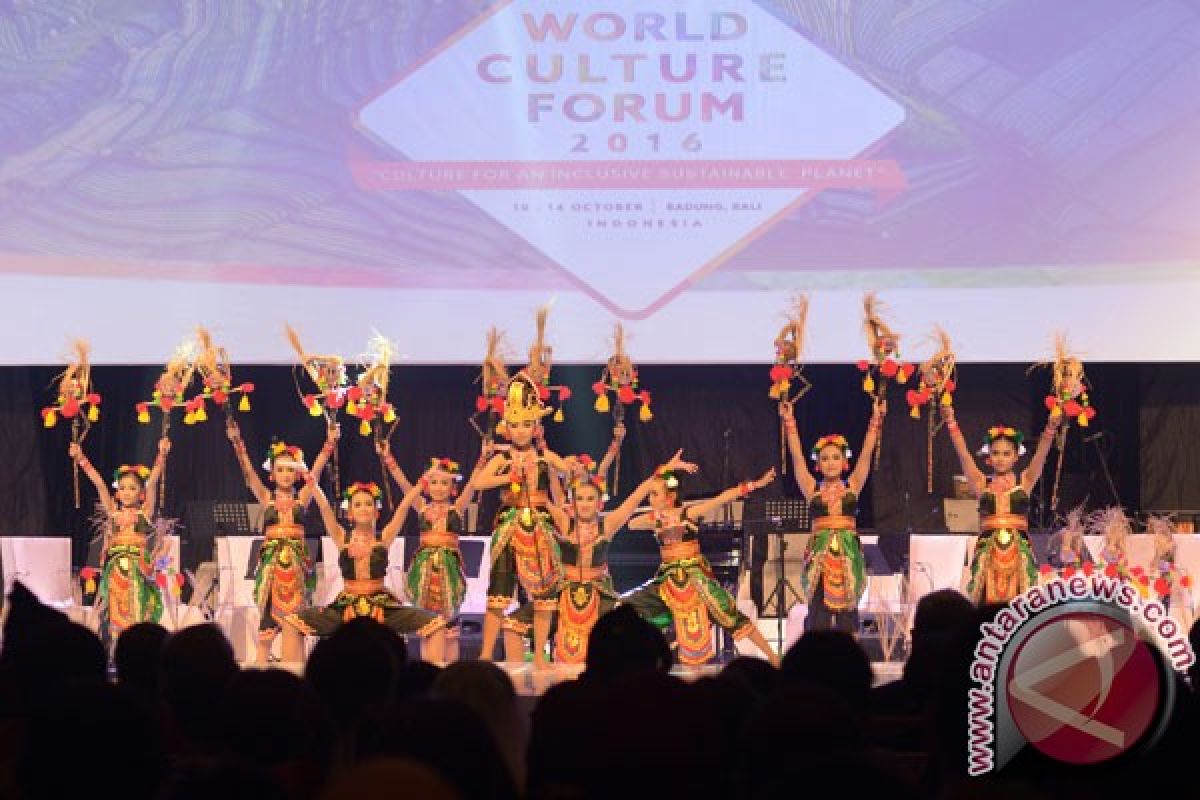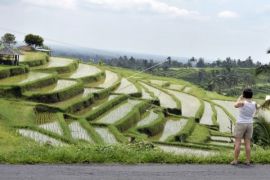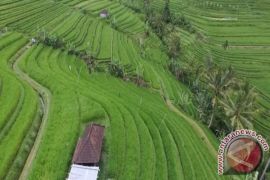We will follow up the declaration immediately and discuss it at a meeting in January 2017."Jakarta (ANTARA News) - The World Culture Forum 2016 (WCF 2016), held in Nusa Dua, Bali, ended on Thursday with the Bali Declaration, which has 10 commitments to strengthen the mainstreaming of culture to drive sustainable development.
Themed "Culture for an Inclusive Sustainable Planet", the WCF 2016 is an essential part of the continuous effort being made to encourage and promote culture as a driver and enabler of sustainable development.
The forum, attended by participants from 63 countries, discussed how local wisdom and the rich cultures of Indonesia and of other nations can be accessed by technology so that they become global values for sustainable development in the future.
Notable local wisdom heritage in Bali includes communal building, planting of rice, irrigation and sustainability of rice fields, which has become a recognized UNESCO Intangible World Heritage site.
The Bali Declaration, read by WCF 2016 Steering Committee chairman Ananto Kusuma Seta, includes an agreement to urge the member states of UNESCO and the wider civil society to integrate cultural consideration into developmental agendas.
Of the 10 commitments in the Bali Declaration, the first supports the full implementation of Sustainable Development Agenda 2030 and will work for a more robust and effective way to mainstream culture into a strategy at all levels of the economic development policy.
The second commitment is to promote a culture of peace in the community and encourage an equitable and inclusive society that respects the diversity of values and cultural heritage as well as protects it.
The third underscores the results of Symposium 6 at WCF by aiming to set up actions to strengthen the role of culture in the paradigm of sustainable development, engage stakeholders in creating the best practices for inclusive sustainable development, and promote the values of multiculturalism and peaceful co-existence.
The fourth declaration is about strengthening the role of the youth in economic activity and the cultural and socio-political environment so as to promote mutual understanding and to bring positive transformation towards equality of social and sustainable development.
The fifth recognizes the role of inter-governmental and international non-governmental organizations in developing a knowledge network about activities that empower constituents to advance progressive culture for inclusive sustainable development.
The Bali Declarations sixth commitment is to develop a strategy that invests in people and empowers local communities. This will be done by formulating an action plan to maintain relations between each meeting of the WCF and to build the process of dialogue between government and civil society so that culture can become a force in resolving world problems.
The seventh is working together with all stakeholders to ensure all plans of sustainable development under Agenda 2030 are responsive to the cultural context and will produce a better, sustainable and equitable outcome for an inclusive planet.
The eighth is a commitment about the UNESCOs support to any effort being made to strengthen the protection of cultural heritage from war and conflict.
The ninth is to improve implementation and emphasize the need to mainstream the role of culture in the indicators and mechanism at every level of Sustainability Development Goals (SDGs).
The tenth and final commitment is to work towards developing a Framework for Action, which will be presented for adoption and launched simultaneously at the 39th session of the UNESCOs General Conference in October 2017, with a view to strengthen the follow-up mechanism under Agenda 2030.
Hilmar Farid, director general of ministry of culture education, said the Bali Declaration will be translated into more serious action.
"We will follow up the declaration immediately and discuss it at a meeting in January 2017," he said, at the closing of WCF 2016 at Bali Nusa Dua Convention Center.
At the closing, 173 youth representatives from 39 countries revealed the declarations of the International Youth Forum 2016 (IYF 2016), one of which is to use digital technology in the next three years to develop an "open source" in order to advance education, social and culture.
Seta said the Bali Declaration will be sent to the UNESCO soon so that it can be adopted as an official document of the United Nations.
"We will improve the language used in the Bali Declaration and send it to UNESCO, possibly next month," he said.
Seta said that in January 2017, the follow-up to WCF 2016 will begin. Some of the actions and the outcome of IYF 2016 will be discussed in detail and there'll be a series of activities at the ministry of culture and education.
"With friends around the world we will formulate measures for more concrete action. We will work together with civil society and private companies to lay culture in the frontline, as a driver of sustainable development," he said.
Culture will become the locomotive of development in the future, he said. At the 2017 UNESCO meeting, cultural affairs could be a "prime mover" of sustainable development.
(T.O001/INE/KR-BSR)
Reporter: Otniel Tamindael
Editor: Priyambodo RH
Copyright © ANTARA 2016









